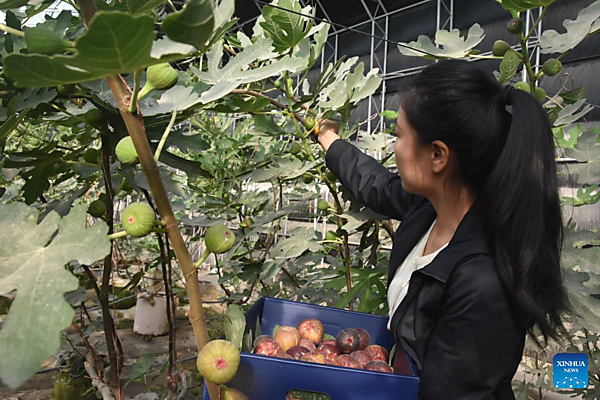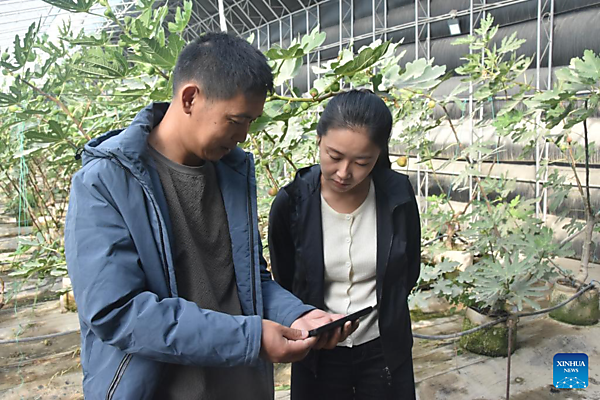 |
| Li Zifan harvests figs at her tech-driven facility agricultural park in Yingxia Township of Korla City, northwest China's Xinjiang Uygur Autonomous Region, Oct. 11, 2025. [Xinhua/Gu Yu] |
URUMQI, Nov. 19 (Xinhua) — In the vast, scorching silence of the Taklimakan Desert, where the relentless wind and sand speak only of barrenness, a young woman hears a different rhythm — the hum of opportunity.
Most see only desolation in the endless yellow sands. Yet to 29-year-old Li Zifan, the desert has become the bedrock of a bold agricultural experiment and proof that her generation is ready to reshape the places that shaped them.
Ironically, the first stirrings of her desert dream appeared in a place lush with greenery — a Yunnan university dorm room, filled with late-night chatter and the scent of various local treats. Each year, the girls exchanged the flavors of home, a cherished ritual steeped in pride and nostalgia.
Li, a native of Korla in northwest China's Xinjiang Uygur Autonomous Region, used to offer her roommates locally produced pears and dates — "uneven in taste, irregular in size," she recalled. Her peers, by contrast, unwrapped fruits that were perfectly uniform, neatly packed, almost showroom-ready.
This stark difference caught her attention. For the economics major, it became more than a comparison of produce — it was a lesson in quality, branding, and the latent potential of the place she came from.
Li's growing conviction pushed her beyond textbooks and into the field, an internship at a local agricultural institute where theory met the stubborn realities of Xinjiang's orchards. What she found was a patchwork of varieties in places that needed uniformity. "My relative's orchard had five kinds of pears, sometimes more than ten," she said. "How could they ever produce a standard product?"
The insight became her compass. After graduating in 2018, Li made a decisive turn homeward, ready to build a business not simply on the land she knew, but on the promise of transforming it.
Like many young founders, she started with enthusiasm — full of energy but lacking in experience — only to meet the hard edge of reality. Her first lesson came quickly: What she hadn't accounted for was water, particularly in the desert's harsh climate, where the supply was heavily mineralized and laden with salt.
With her parents' financial backing, Li poured more than 700,000 yuan (about 98,770 U.S. dollars) into an advanced Israeli drip-irrigation system. Yet Xinjiang's alkaline water choked the emitters within half a year, leaving the sophisticated equipment hopelessly clogged and unusable.
"In another venture, I invested several hundred thousand yuan in cherry saplings from Beijing," Li recalled. "But because of our alkaline water and the brutal climate, they died in droves."
The financial loss was staggering, a blow that stopped her in her tracks and forced a sober moment of self-examination. What followed was a blend of resilience and realism as she shifted course, choosing to "borrow wisdom" from those who knew the land far better.
She sought out specialists from Shihezi University, Tarim University and local research institutes. It was through Professor Wang Dengwei at Shihezi University that she finally found the breakthrough she'd been searching for — a sand-based cultivation technology that could turn the desert's greatest limitation into its greatest asset.
At first glance, the idea sounds absurd. How could sterile, nutrient-poor sand support life? Yet Li has a knack for making the counterintuitive compelling. "Soil can carry bacteria, viruses, even insect eggs," she said. "Sand, though it lacks nutrients, is clean."
In this model, bagged sand simply holds the roots in place while an integrated water-fertilizer drip system feeds them an exact blend of nutrients. The technique avoids the pitfalls of mineral-heavy local water and transforms what the desert has in abundance — sand — into its most valuable agricultural tool.
With that breakthrough, Li's desert dream finally broke ground. In 2020, she converted 90 mu (6 hectares) of abandoned greenhouses in Korla's Yingxia Township into a sleek, tech-driven facility agricultural park with 23 smart greenhouses using sand-based cultivation technology. They cooperated with local farmers growing strawberries, tomatoes and figs. There, agriculture runs on fingertips: temperature, humidity, even nutrient delivery are controlled through a single smartphone.
"As a woman, and with most of our team being women, repetitive heavy labor isn't our strong suit," Li said, highlighting how innovation has changed the face of farm work.
Through steady trial and error, her team fine-tuned the approach, finding that mixing reed substrate into the sand gave long-cycle fruits like figs, apples and pears the structure they needed to flourish. Their efforts paid off. In just one 840-square-meter greenhouse, more than 400 fig trees thrive, yielding about 1.7 tonnes of fruit annually and generating roughly up to 80,000 yuan in yearly revenue.
Even more compelling is the technology's adaptability. "On a gobi desert in Luntai County where even grass wouldn't grow, we managed to cultivate white apricots," Li said, noting that the breakthrough points to a future where fruit production can shift to marginal lands, leaving high-quality arable soil for the grain crops.
The impact of her work now ripples through the wider community. Her company has spurred upgrades in nearly 1,700 greenhouses and spread more than 1,000 mu of improved pear saplings across the region. She also employs local villagers, especially women, offering flexible jobs that allow them to work close to home. "It means a lot to us that we can help them secure jobs," Li said.
Muzapa Memet, a local villager in Yingxia Township, lives near the greenhouses. Her daily work — ventilating the greenhouses, replacing plant pots, and watering the plants — earns her a steady monthly salary of 3,500 yuan.
Li's company has also cultivated more than 450,000 potted fruit trees, including apple, cherry, grape and more, with an annual output value exceeding 50 million yuan.
For her, the greatest satisfaction remains beautifully uncomplicated. "My biggest pleasure is when someone takes a bite of my fruit and says: 'Wow, this is delicious,'" she said. In that instant of pure delight lies the affirmation of everything she's built — the sweet harvest of a dream that once dared to grow from desert sand.
 |
| Li Zifan (R) and a technician check the condition of other greenhouses through a mobile app at her tech-driven facility agricultural park in Yingxia Township of Korla City, northwest China's Xinjiang Uygur Autonomous Region, Oct. 11, 2025. [Xinhua/Gu Yu] |
(Source: Xinhua)
Editor: Wang Shasha